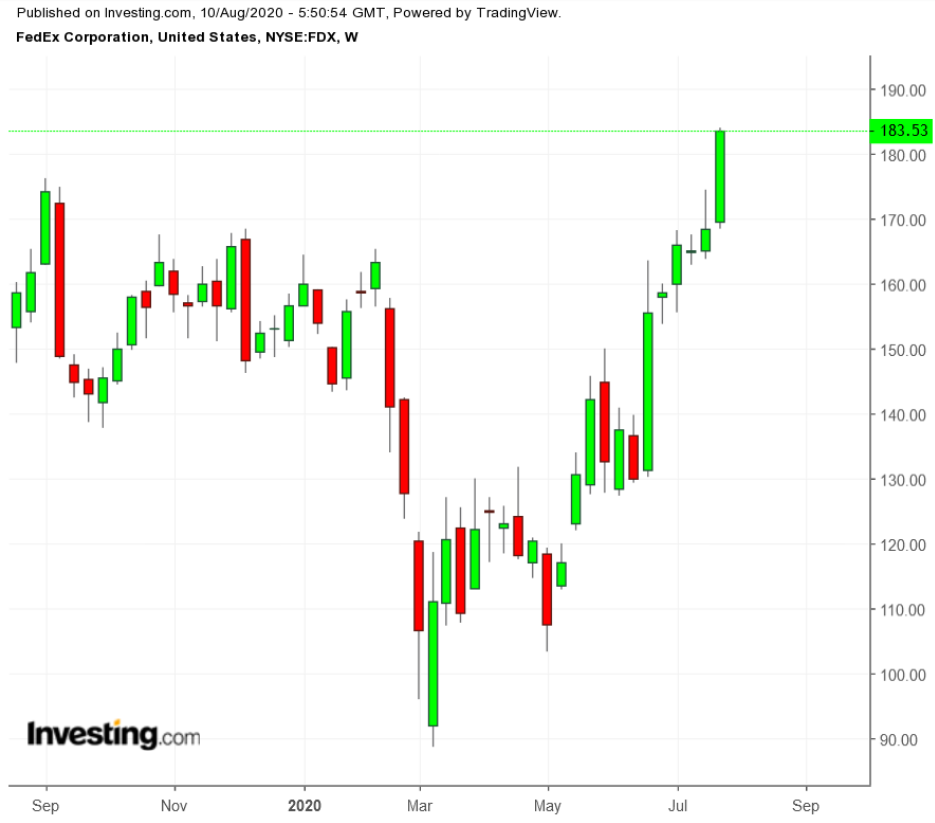Why Are FedEx Shares Soaring?
Investing.com | Aug 10, 2020 12:49PM ET
The world’s largest parcel-delivery service, FedEx Corporation (NYSE:FDX) has had an unexpected turn in its fortunes. After massively underperforming the market last year, its stock is now surging.
Indeed, the Memphis, Tenessee-based freight and logistics company is proving to be one of the best equity market bets amid the COVID-19 pandemic.

During the past three months, shares of the transportation giant have soared more than 50%, when the S&P 500 Index gained 14%. The stock closed on Friday at $183.53, after rising more than 6% for the day.
Investors have turned bullish on the stock, encouraged by growing demand for the company’s delivery services during the pandemic when shoppers have turned to e-commerce during lockdowns and an overall stay-at-home environment.
Luckily, FedEx’s business restructuring—which was planned before the pandemic—proved to be a great launching pad in this new environment. Before COVID-19 spread across the globe, the company had already moved to a seven-day service model, expanded capacity for larger packages, introduced new routing software and began pushing more Express packages into the lower-cost Ground network.
Those changes helped the company increase profit on a flood of residential packages while its more lucrative business delivery service suffered during the US lockdown.
Escalating Ground Deliveries
The company’s latest quarterly earnings also showed that FedEx is well-prepared to take advantage of this new situation. Its profit for the quarter which ended in May exceeded analysts’ forecast with a big margin, as sales from its Ground unit surged 20%.
Home deliveries accounted for 72% of the division’s sales by volume, compared with 56% in the same period a year earlier.
Before the pandemic, FedEx was struggling to win investors' confidence. The biggest concern keeping them on the sidelines was the ongoing trouble its European business faced after its costly takeover of Dutch courier service TNT in 2015. That deal failed to unlock the value investors were hoping to see.
The integration challenges and the slowing European economy had raised doubts about the benefits of the TNT deal, with some analysts questioning the wisdom behind this massive undertaking. But the global health crisis has changed the business dynamics, giving management a window of opportunity to turn around the business.
“I anticipate customers to pay more for pricing in November and December moving forward, and I do think that that will be a structural shift in the market,” said Brie Carere, FedEx chief marketing officer on a conference call with analysts in June.
Along with booming ground sales, the company has been successful in keeping a check on costs with a mix of job cuts, reduced incentive compensation, aircraft retirements and delays to some planned investment projects.
After these moves, analysts are again favorably disposed to FedEx shares. In a note last week, financial services firm Stephens named the shipping company as the best idea and raised its price target to a Street high of $215 from $180.
“The current setup for FedEx is perhaps the best it has been since mid-2013. During that period, a number of internal initiatives combined with an improving macro backdrop to ultimately drive a string of positive estimate revisions and a doubling of the stock over the next 18 months,” the note said.
“We see a number of similarities today and yet the stock remains stubbornly range bound despite increasingly positive demand and pricing anecdotes.”
Among the 28 analysts covering the stock, 21 have given it a buy rating and 7 recommend it as a hold. Despite these bullish sentiments and the recent rebound, FedEx shares are is still considerably below their five-year high of $274.66, hit in early 2018.
Bottom Line
FedEx is clearly one of the beneficiaries of the pandemic-driven boom in e-commerce. These macro trends are likely to remain in place, helping the company alleviate pressures on its cash flow and making a case for additional gains in its stock price.
Trading in financial instruments and/or cryptocurrencies involves high risks including the risk of losing some, or all, of your investment amount, and may not be suitable for all investors. Prices of cryptocurrencies are extremely volatile and may be affected by external factors such as financial, regulatory or political events. Trading on margin increases the financial risks.
Before deciding to trade in financial instrument or cryptocurrencies you should be fully informed of the risks and costs associated with trading the financial markets, carefully consider your investment objectives, level of experience, and risk appetite, and seek professional advice where needed.
Fusion Media would like to remind you that the data contained in this website is not necessarily real-time nor accurate. The data and prices on the website are not necessarily provided by any market or exchange, but may be provided by market makers, and so prices may not be accurate and may differ from the actual price at any given market, meaning prices are indicative and not appropriate for trading purposes. Fusion Media and any provider of the data contained in this website will not accept liability for any loss or damage as a result of your trading, or your reliance on the information contained within this website.
It is prohibited to use, store, reproduce, display, modify, transmit or distribute the data contained in this website without the explicit prior written permission of Fusion Media and/or the data provider. All intellectual property rights are reserved by the providers and/or the exchange providing the data contained in this website.
Fusion Media may be compensated by the advertisers that appear on the website, based on your interaction with the advertisements or advertisers.